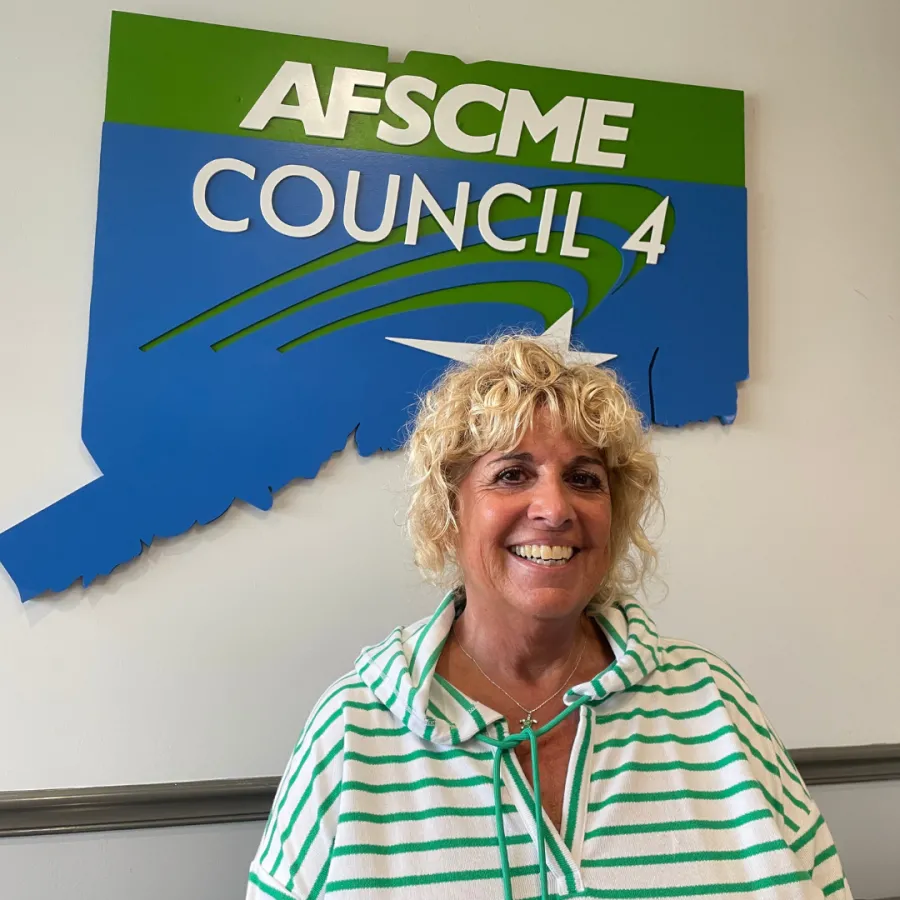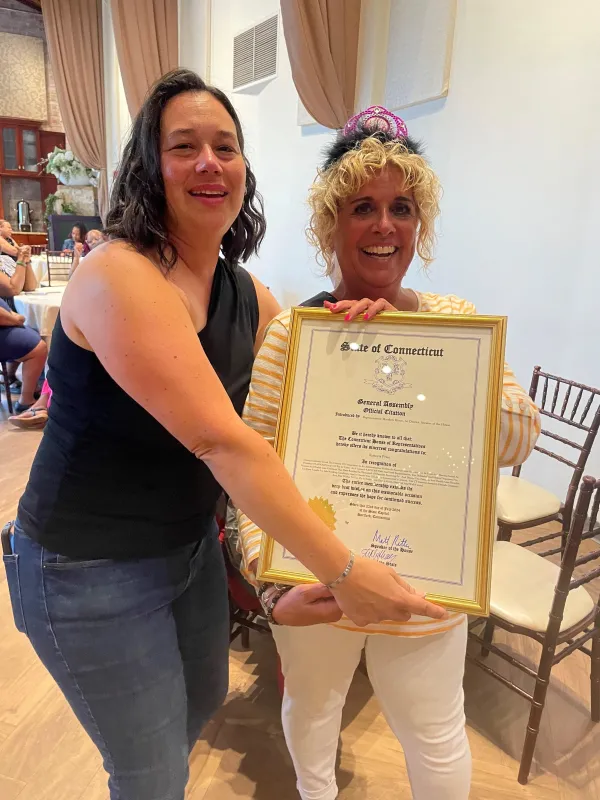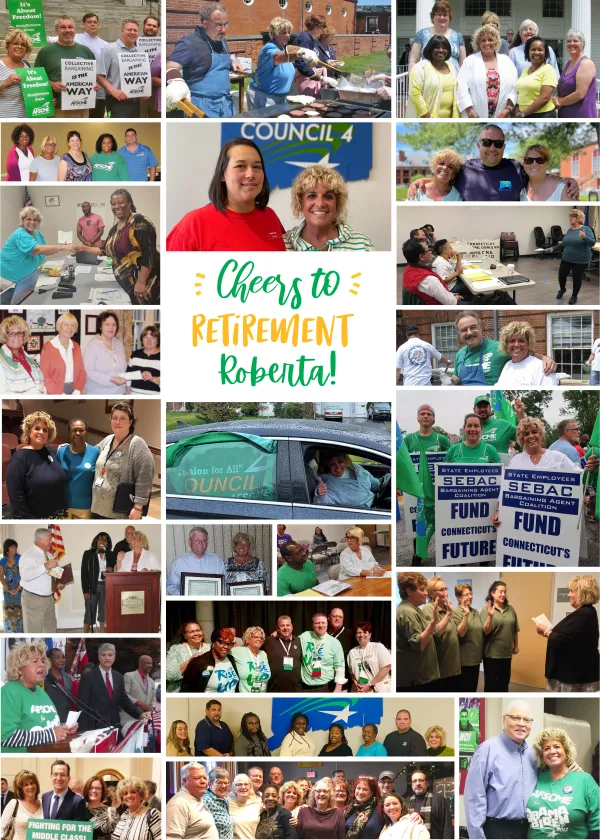Roberta Price Retires After More Than 4 Decades in CT Labor Movement

Roberta Price officially retired this summer after 36 years as a state employee—including 11 years as President of AFSCME Local 610 (NP-3/State Administrative Clerical)—and an additional 11 years as a Council 4 staffer.
In recognition of her dedicated career, the Connecticut General Assembly honored Price with an official citation for her “faithful service” in “fighting for safe working conditions and a decent way of life for Connecticut citizens.”
[caption caption="L-R: Council 4 Service Representative Heather Longo-Racicot & Roberta Price proudly holding the official citation during her retirement party at the Pond House Cafe in West Hartford in July 2024." align="left"]
Price’s union journey began in 1975 as a clerk typist at Norwich State Hospital, coinciding with the year Connecticut state employees won collective bargaining rights. Surrounded by supportive colleagues, she found fulfillment in serving the forensic population, but her aspirations grew.
She started her union involvement as a steward for Local 610, which transitioned from the CT State Employees Association to an independent union, eventually becoming chartered with AFSCME in 1982. Price fondly recalls this as “the best time ever to be a state employee.”
A pivotal moment came when Mike Ferruci, Council 4 Executive Director from 1997 to 2001, encouraged her to take on a more active role in the union. With Ferruci’s nurturing, new doors opened for Roberta, who saw herself at the time as just a young 20-year-old girl from Ledyard who frequently hung out at the beach. Her world was confined to the southeastern corner of the state, and she was not even familiar with New Britain, where Council 4's headquarters are located.
“When he said I was going to be the face of AFSCME, he wasn’t kidding,” she said. “He knew something that I didn’t. Once I got going, I never turned back. Don’t ask me why, but I always attended my membership meetings. I had a strong sense of duty.”
After Governor Lowell Weicker took office in 1991, Price joined the state bargaining negotiating committee and later became President of Local 610. Throughout her tenure, she fought relentlessly for clerical administrative members, notably advocating for NP-3 members in correctional managed health care with UConn who called to ask whether they had to come to work during a severe winter storm in the early 2000s. She contacted Governor Rowland directly when department administrators were unresponsive, defying the chain of command without regrets.
“It was their way of saying, ‘It’s not our problem; you figure it out,’” she said. “I was a little wild child in those days because I would get it done. I didn't know how I was going to get it done, but I did. I did whatever I had to do.”
Throughout her tenure, Roberta witnessed many challenges, including massive layoffs, the introduction of technology that rendered many clerical jobs obsolete, and persistent issues with state budgets that reduced the number of of clerical members from 10,000 to about 2,500. “Instead of having the brainpower to manage fiscal crises in a constructive way," Price said, "they took the easy route and just started laying people off rather than trying to fix it. It was a real hardship on the agencies.”
Despite these challenges, Price has always believed in the power of unions to support workers. “If you don't have the union, you have no middle class,” she said. “If you don't have someone negotiating on health care, pensions, and pay—the most important things—then you don't have as good of a future. Our union has to be strong, and people really have to understand that the best situation you could be in is to be in a union.”
In 2013, Price joined Council 4, retiring as a staff representative after leading negotiations for multiple contracts and supporting NP-3 presidents. Heather Longo-Racicot, a Council 4 staff representative, worked alongside Roberta as a service representative for many years and sees her as more than just a teammate and mentor.
“Roberta’s dedication to the NP-3 bargaining unit is unwavering,” said Longo-Racicot. “The guidance and institutional knowledge she has shared are invaluable, and her friendship and patience are priceless.”
Jody Barr, Council 4 Executive Director, echoed the contributions Roberta has made. “The passion for public service Roberta has shown throughout her career, coupled with her wealth of union wisdom, is not only rare but unmatched,” said Barr. “We can’t thank her enough for going above and beyond for our members. Our movement is stronger and better off thanks to her leadership. It’s no wonder she was praised by all NP-3 presidents last year, who described her as a mentor, role model, therapist, and friend.”
Roberta’s fondest memories include the active union roles she took on. From serving on the Women’s Committee in D.C. and the Credentials Committee for AFSCME’s International Conventions to canvassing for labor-endorsed candidates, such as Senator Cathy Osten in Norwich, there was no shortage of ways she was willing to show that unionism happens through activism and participation, not from the sidelines. She even once introduced the late Gerry McEntee, AFSCME President for 31 years, during an International Convention.
“That was pretty neat,” she recalled. “I'll never forget… I had to go into the convention hall and give a speech, and they had to adjust my voice. We had some great conventions and a lot of camaraderie between all the states. I was given a lot of opportunities by the union.”
Whether providing ardent support for members and leaders during heated contract negotiations or navigating budget dilemmas that shook up state employment, Roberta has seen her fair share of battles. As she leaves her role, Price’s parting message emphasizes unity; a practice members and the State alike can learn from, especially as state employee wage, health care, and pension negotiations are underway.
“The divide-and-conquer mentality,” she said, “is not a good philosophy and not a good way to do business. We need to find common ground because if we can’t, we’ll never fix anything.”
She added, “It's not an all-or-nothing world. We all have to land somewhere we can all live and get along. Work together for the common goal of the members; that’s the big thing.”

